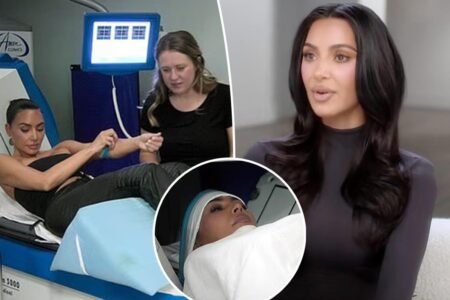Aging well never gets old.
We used to think of successful aging as simply avoiding disease — that concept has evolved over the years to a broader, more holistic view that includes physical, mental, emotional and social well-being.
The problem is that it can be difficult to tell how well you’re aging without wearing a premium health tracker or visiting a pricey longevity clinic.
Enter Dr. Mitch Ghen, medical director of physician education at Access Medical Labs, who specializes in anti-aging, holistic and integrative medicine.
He shares five subtle signs of healthful aging and several warning signs you shouldn’t ignore — no blood work or cheek swabs required.
A strong grip
“Stronger grip strength correlates with better muscle mass, cardiovascular health and longevity,” Ghen told The Post.
This can be measured at a doctor’s office by squeezing the handle of a dynamometer with maximum effort for a few seconds. It’s a tougher test than you might imagine.
You can also gauge your strength at home by clenching a tennis ball or wringing out a wet towel.
It’s just one measure of a healthy and strong muscular system — good flexibility and consistent energy are also indicators.
Joint pain and stiffness, muscle weakness and sarcopenia (muscle loss that occurs with aging) are key warning signs that your muscular system may be in trouble, Ghen said.
Movement with ease
The benefits of regular exercise are endless — it strengthens bones and muscles, increases flexibility and balance, helps maintain a healthy weight, boosts cognitive function, reduces stress and anxiety and enhances mood and sleep.
Experts recommend doing at least 150 minutes of moderate-intensity exercise and spending two or more days each week working all the major muscle groups.
If you find yourself dizzy, out of breath or fatigued with minimal activity, or notice an irregular heartbeat or swelling, your heart may be having trouble pumping blood effectively.
Quick recovery from viruses and infections
Prolonged illnesses and frequent infections are common red flags of a distressed immune system.
You should be able to recover from most viruses within 10 days, Ghen said.
Acute inflammation is the immune system’s natural and healthy response to injury or infection.
But chronic low-grade inflammation can last months or even years — long after the initial threat has passed. This persistent inflammation may be visible in your mouth.
“Check your gums — they should not bleed or be inflamed with regular flossing or brushing,” said Ghen, who recommends reducing inflammation with the natural compounds curcumin (found in turmeric) and EGCG (found in green tea).
Good mood and libido
Our hormone levels naturally fluctuate and decline as we get older.
Hormonal changes may manifest as mood swings, mental fogginess, low libido, hot flashes, hair loss and sleep problems.
Testosterone therapy can benefit men with low libido and fatigue and women experiencing menopause symptoms, particularly when combined with estrogen and progesterone.
Pregnenolone and DHEA supplements may help “keep hormones at youthful levels,” Ghen said.
A sharp mind
Increased forgetfulness, confusion, poor concentration and personality changes may signal significant brain function declines.
The brain is like a muscle — you should keep strengthening it by learning new things.
Exercises, like stating as many words as you can think of that start with the letter “F,” challenge your brain as you age and help maintain cognitive function.
And don’t forget about sleep, which is crucial for brain health.
For optimal ZZZ’s, Ghen recommends steering clear of sleep meds, keeping your bedroom dark, leaving your cell phone outside and shutting off Wi-Fi until the next morning.
Simple aging tests to try at home
Looking to get a sense of your overall health before you book an appointment with your doctor?
Ghen suggests monitoring your ability to complete these DIY physical tests.
- Sit on the floor and try to stand up without using your hands.
- Sit on a chair and see if you can stand, then sit 30 times without difficulty.
- Place your hand flat on a table and use your other hand to pinch up the skin between your thumb and first digit — the skin should quickly return to its original position.
- Test your balance by walking where the heel of the front foot touches the toes of the back foot with each step.
- Stand on one foot with your eyes open and hands and arms out for 30 seconds.
Read the full article here












